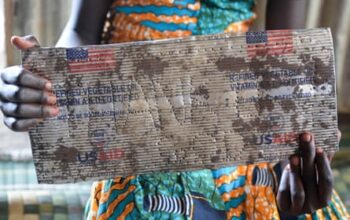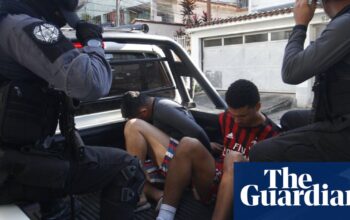
Residents in Omdurman reported extensive pillaging by members of the Sudanese armed forces in the sole remaining section of the city under their control.
Residents of Ombada, a district located west of Omdurman and situated across the Nile river from the capital city Khartoum, reported that soldiers had looted various items ranging from cars to cutlery. They also mentioned that the soldiers had opened fire on anyone who attempted to intervene.
Mariaim Yassin reported that soldiers entered her mother’s home shortly after her passing and removed an air conditioning unit, television, and clothing using a donkey. The neighbors who attempted to intervene were met with live ammunition fired at their feet, fortunately causing no injuries.
Yassin shared that her family was compelled to vacate their residences because of confrontations between the military and the paramilitary Rapid Support Forces group during the earlier stages of the war. Once the conflict calmed down, the family went back. She expressed optimism when the army was stationed in their vicinity, but unfortunately, they continue to plunder everything.
Yassin was in possession of her mother’s furniture, which she had taken to her own home for safekeeping. However, one day she was approached by three soldiers who questioned her about its whereabouts. Yassin admitted to feeling frightened and unable to provide any information to the soldiers. Fortunately, when a male neighbor appeared, the soldiers left.
The homes of people from the Rizeigat community, which makes up the core of the RSF, have been badly affected. Soldiers have been seen on a daily basis leaving the houses of Rizeigat people who fled to other parts of Sudan earlier in the war, pushing carts full of items including beds, tables and televisions.
Most homes in the western section of the Ombada 19 neighborhood have unlocked front doors, indicating that they have likely been robbed.
In certain cases, military personnel have been taking goods that were already taken by civilians who had entered the homes of affluent individuals who left at the start of the war in April. This conflict has resulted in over 12,000 deaths, forced 6.5 million people to relocate, and greatly impacted Sudan’s economy.
Last month, a man residing in a Rizeigat community was wounded in the leg by soldiers who were attempting to rob him. On the same day, four women from the area went missing. The relatives of one of the women discovered her earrings and passport at a hospital in an area controlled by the army. They were informed that she had been buried, but were not provided with any additional information.
The RSF has faced allegations of theft in regions it oversees, including financial institutions in the heart of Khartoum, as well as private residences and vehicles. There have been accounts of stolen goods being traded in Chad and Niger.
A potential reason for the plundering is the low wages of the regular army. It is estimated that soldiers earn approximately one-tenth of what their counterparts in the RSF make, as the RSF holds extensive territories in the western region of Darfur that are abundant in gold and other valuable minerals.
The military did not reply to a request for a statement. An advisor from the RSF denied that their soldiers were accountable for any theft.
Last week, the Norwegian Refugee Council, one of the few organizations still offering crucial assistance in Sudan, stated that the conditions for millions of individuals in the country are extremely grave.
“I have never witnessed such a catastrophic event with such inadequate efforts and resources to assist those in dire need,” stated Jan Egeland, the secretary general of NRC. He expressed to Agence France-Presse, “Millions are stranded in the midst of conflict, ethnic tensions, and bombing, and we are failing to provide assistance.”
Over the weekend, both the army and the RSF expressed skepticism about a statement by regional mediators stating that they had agreed to a ceasefire and talks for a resolution.
The Inter-Governmental Authority on Development (IGAD), a collection of countries in East Africa, has joined forces with the United States and Saudi Arabia to help find a resolution to the ongoing conflict.
The IGAD announced that General Abdel Fattah al-Burhan, chief of the army, and Mohamed Hamdan Dagalo, leader of the RSF, had decided to hold their first meeting since the start of the conflict. They also discussed a potential ceasefire without any conditions.
On Sunday, the foreign ministry aligned with the army released a statement saying it does not acknowledge the IGAD statement because it does not include the points it had previously made. These points specifically mention that the meeting with Dagalo would only take place if there is a permanent ceasefire and if the RSF troops are removed from Khartoum.
The RSF stated that they would only agree to the meeting if Burhan did not attend as the head of state. He has held this position since 2019, when the army and RSF collaborated to remove the country’s former dictator, Omar al-Bashir.
The military sees the war as a revolt led by the RSF and is unlikely to agree to this condition.
Source: theguardian.com


